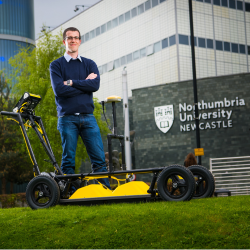-
Study
-
UCAS Clearing 2024
- Clearing Courses
- The Clearing Process
- UCAS Tariff Points
- Clearing 2024 FAQs
- Confirmation
- Clearing Virtual Event
-
Undergraduate
- Search for a Course
- Undergraduate Open Day & Events
- Application Guides
- Northumbria University UCAS Exhibitions
- Foundation Years
- Undergraduate Fees & Funding
- School & College Outreach
- Continuing Professional Development
-
Postgraduate
- Postgraduate Study Degree
- Postgraduate Research Degrees
- Postgraduate Open Days and Events
- Postgraduate Fees & Funding
- Flexible Learning
- Thinking about a Masters?
- Continuing Professional Development
- Change Direction
-
Student Life
- The Hub - Student Blog
- Accommodation
- Life in Newcastle
- Support for Students
- Careers
- Information for Parents
- Students' Union
- Northumbria Sport
-
-
International
International
Northumbria’s global footprint touches every continent across the world, through our global partnerships across 17 institutions in 10 countries, to our 277,000 strong alumni community and 150 recruitment partners – we prepare our students for the challenges of tomorrow. Discover more about how to join Northumbria’s global family or our partnerships.
View our Global Footprint-
Applying to Northumbria
- European Union
- Our London Campus
- Northumbria Pathway
- International Events
- Entry Requirements and Country Representatives
- Regional Offices
-
Northumbria Language Centre
- Faculty Requirements
- Acceptable English Requirements
- Pre-Sessional English and Study Skills
- Academic Language Skills Programmes (ALS)
-
International Fees, Funding & Scholarships
- International Undergraduate Fees
- International Undergraduate Funding
- International Masters Fees
- International Masters Funding
- International Postgraduate Research Fees
- International Postgraduate Research Funding
- International Money Matters
-
Life at Northumbria
- International student support
- Careers
-
International Mobility
- Current Northumbria Students
- Incoming Exchange Students
-
-
Business
Business
The world is changing faster than ever before. The future is there to be won by organisations who find ways to turn today's possibilities into tomorrows competitive edge. In a connected world, collaboration can be the key to success.
More on our Business Services -
Research
Research
Northumbria is a research-rich, business-focused, professional university with a global reputation for academic quality. We conduct ground-breaking research that is responsive to the science & technology, health & well being, economic and social and arts & cultural needs for the communities
Discover more about our Research -
About Us
-
About Northumbria
- Our Strategy
- Our Staff
- Place and Partnerships
- Student Profiles
- Alumni Profiles
- Leadership & Governance
- Academic Departments
- University Services
- History of Northumbria
- Contact us
- Online Shop
-
-
Alumni
Alumni
Northumbria University is renowned for the calibre of its business-ready graduates. Our alumni network has over 237,000 graduates based in 178 countries worldwide in a range of sectors, our alumni are making a real impact on the world.
Our Alumni - Work For Us
What will I learn on this module?
This module is designed to teach you the concepts and techniques of spatial data handling and analysis using the techniques of remote sensing and image processing and Geographical Information Systems (GIS). Adding to the cartographic skills and basic spatial analysis that you have learnt from level 4 (first year) you will be taught to carry out spatial analysis from a wider range of sources and types of social and scientific geographical data. You will learn basic theoretical principles underpinning the use and application of digital datasets followed by more advanced techniques of image classification and spatial analysis. You will be taught how to use industry standard computer software applied in research and the workplace that will allow you to manipulate and analyse those data. In particular you will learn:
• the key components of remote sensing acquisition and analysis/display;
• theoretical background of datasets that can be generated and used to interpret change over space and time;
• the techniques used to classify and analyse datasets;
• key critical theoretical concepts associated with the types and associated use of digital data; and
• the practical skills you need to interrogate and analyse data in order to answer spatial queries.
How will I learn on this module?
In this module, you will learn through lectures and IT workshops. In addition to timetabled sessions, your independent study will be guided and supported through your engagement with a range of interactive learning resources accessible on-line via the module eLP site, including electronic reading lists.
Lectures will be used to introduce and develop key issues, concepts, and theoretical principles across the range of topics covered on the module, thus acting as a framework to support your learning, and understanding of the practical application of skills taught in IT workshops. In the first part of the module, you will develop your practical and technical skills with guided exercises and directed learning to support you in completing a portfolio of tasks associated with each exercise. The IT workshops are supervised but you will be expected to finish the portfolio tasks in your own time whilst exploring in more detail key theoretical principles provided in lectures. In the second part of the module, the IT workshops are designed to support your engagement with a final geospatial analysis project. The IT workshops enable you to analyse and interpret a wide of range of digital datasets and are designed to improve your ability to solve complex problems applying the latest techniques using industry-standard software. In addition you will be given directed reading and reference to online resources that you will need to explore for examples of the techniques you are learning implemented in research or in the public and private sector.
You will be assessed through: (i) a portfolio based on practical exercises delivered in the first part of the module (up to 1000 words, 40% weighting); and (ii) a written project report combining the use of image processing and spatial analysis practical skills at the end of the second part of the module (up to 2000 words, 60% weighting). You will receive formative feedback in practical classes and summative feedback on submitted coursework.
How will I be supported academically on this module?
Module content and guidance will be made available by your module tutor in lectures as well as via the module eLP site. During IT sessions, you will interact closely with teaching staff who will provide formative support (demonstrations are often provided at the start of the class) and feedback on activities leading up to the assessment tasks, you will also benefit from interaction and problem solving with your fellow students in working through the workbooks. An interactive reading list with on-line access to several key articles is available to you, some of which will be linked to the weekly lecture programme. Teaching staff operate a virtual ‘open door’ policy for students meaning that you can email us at any time during normal office hours to arrange either a virtual or a face to face meeting (during normal office hours) , or to answer questions, receive feedback and support your learning on the module.
What will I be expected to read on this module?
All modules at Northumbria include a range of reading materials that students are expected to engage with. The reading list for this module can be found at: http://readinglists.northumbria.ac.uk
(Reading List service online guide for academic staff this containing contact details for the Reading List team – http://library.northumbria.ac.uk/readinglists)
What will I be expected to achieve?
Knowledge & Understanding:
• MLO 1: Evaluate appropriate techniques of image processing and analysis.
• MLO 2: Evaluate the fundamental capabilities and limitations of digital data and geospatial methods for spatial analysis.
Intellectual / Professional skills & abilities:
• MLO 3: From a choice of different methods and techniques be able to generate and describe different types of digital data and their purpose.
• MLO 4: Select and apply appropriate techniques in image processing and analysis and geospatial analysis to generate and/or combine data for interpretation to answer set aims and objectives.
• MLO 5: Critically review the use of digital data from a variety of sources and identify, and quantify and manage error.
Personal Values Attributes (Global / Cultural awareness, Ethics, Curiosity) (PVA):
How will I be assessed?
Summative Assessment:
Individual Portfolio - maximum 1000 words
Weighted 40% of module mark.
Your portfolio submission is linked to IT practicals and associated exercises. The portfolio tasks require you to integrate theoretical and practical aspects of data generation and the use of software and associated tools to develop your understanding of how digital data is generated and applied to spatial analysis and for image processing and analysis.
MLOs 1, 2, and 3
Individual Project report - 2000
Weighted 60% of module mark
The second assignment requires you to design and implement a geospatial technique to address a set of objectives. Knowledge and practical skills gained from the first assignment are expanded upon and added to in the following IT workshops. Formative feedback is provided by staff when you are working on the datasets and designing a method.
MLOs 3, 4 and 5
You will receive formative feedback on work to be submitted for your portfolio and report during practical classes. This will provide guidance on the expected style and standard of work and engender confidence and engagement. Annotated feedback, together with the mark awarded, will enable students to feed forward key aspects into assessments for this module and in other modules at both levels 5 and 6. The practical and project/enquiry-based nature of the assessments will also support students in thinking ahead towards their final year dissertation.
Pre-requisite(s)
KE4005
Co-requisite(s)
None
Module abstract
Developing practical skills in analysing digital datasets and understanding the implications and benefits of doing so is an emerging key skill set used in practice leading to the development and implementation of policy in the public and private sector. You will be learning how to use industrial standard software and in understanding the tools and techniques available, applying them to design a methodology, problem solve and explore the strengths and weakness of your results relative to objectives being set in your assignments on this module, an essential skill in the workplace. All the skills that you are taught on this module are transferable to a wide range of practices: town planning, population dynamics, hazard/risk assessment, food sustainability, environmental protection, pollution monitoring and control, and understanding of physical processes in the environment.
Course info
UCAS Code F800
Credits 20
Level of Study Undergraduate
Mode of Study 3 years Full Time or 4 years with a placement (sandwich)/study abroad
Department Geography and Environmental Sciences
Location City Campus, Northumbria University
City Newcastle
Start September 2024 or September 2025
All information is accurate at the time of sharing.
Full time Courses are primarily delivered via on-campus face to face learning but could include elements of online learning. Most courses run as planned and as promoted on our website and via our marketing materials, but if there are any substantial changes (as determined by the Competition and Markets Authority) to a course or there is the potential that course may be withdrawn, we will notify all affected applicants as soon as possible with advice and guidance regarding their options. It is also important to be aware that optional modules listed on course pages may be subject to change depending on uptake numbers each year.
Contact time is subject to increase or decrease in line with possible restrictions imposed by the government or the University in the interest of maintaining the health and safety and wellbeing of students, staff, and visitors if this is deemed necessary in future.
Useful Links
Find out about our distinctive approach at
www.northumbria.ac.uk/exp
Admissions Terms and Conditions
northumbria.ac.uk/terms
Fees and Funding
northumbria.ac.uk/fees
Admissions Policy
northumbria.ac.uk/adpolicy
Admissions Complaints Policy
northumbria.ac.uk/complaints














